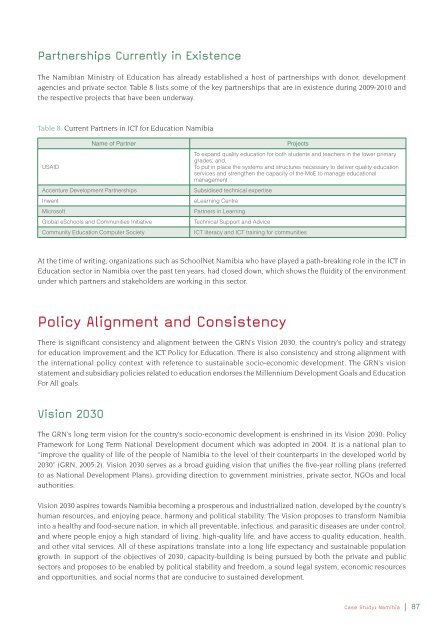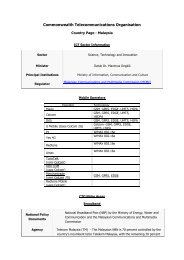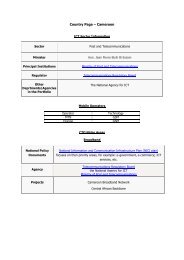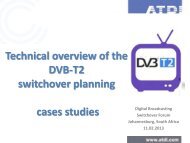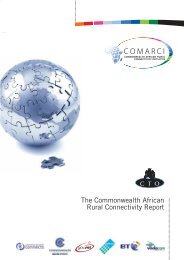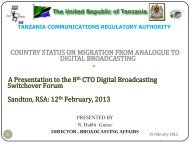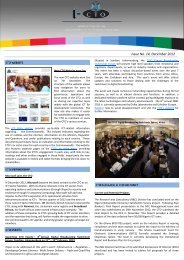Transforming education: the power of ICT policies - Commonwealth ...
Transforming education: the power of ICT policies - Commonwealth ...
Transforming education: the power of ICT policies - Commonwealth ...
You also want an ePaper? Increase the reach of your titles
YUMPU automatically turns print PDFs into web optimized ePapers that Google loves.
Partnerships Currently in Existence<br />
The Namibian Ministry <strong>of</strong> Education has already established a host <strong>of</strong> partnerships with donor, development<br />
agencies and private sector. Table 8 lists some <strong>of</strong> <strong>the</strong> key partnerships that are in existence during 2009-2010 and<br />
<strong>the</strong> respective projects that have been underway.<br />
Table 8: Current Partners in <strong>ICT</strong> for Education Namibia<br />
Name <strong>of</strong> Partner Projects<br />
To expand quality <strong>education</strong> for both students and teachers in <strong>the</strong> lower primary<br />
grades; and,<br />
USAID<br />
To put in place <strong>the</strong> systems and structures necessary to deliver quality <strong>education</strong><br />
services and streng<strong>the</strong>n <strong>the</strong> capacity <strong>of</strong> <strong>the</strong> MoE to manage <strong>education</strong>al<br />
management<br />
Accenture Development Partnerships Subsidised technical expertise<br />
Inwent eLearning Centre<br />
Micros<strong>of</strong>t Partners in Learning<br />
Global eSchools and Communities Initiative Technical Support and Advice<br />
Community Education Computer Society <strong>ICT</strong> literacy and <strong>ICT</strong> training for communities<br />
At <strong>the</strong> time <strong>of</strong> writing, organizations such as SchoolNet Namibia who have played a path-breaking role in <strong>the</strong> <strong>ICT</strong> in<br />
Education sector in Namibia over <strong>the</strong> past ten years, had closed down, which shows <strong>the</strong> fl uidity <strong>of</strong> <strong>the</strong> environment<br />
under which partners and stakeholders are working in this sector.<br />
Policy Alignment and Consistency<br />
There is signifi cant consistency and alignment between <strong>the</strong> GRN’s Vision 2030, <strong>the</strong> country’s policy and strategy<br />
for <strong>education</strong> improvement and <strong>the</strong> <strong>ICT</strong> Policy for Education. There is also consistency and strong alignment with<br />
<strong>the</strong> international policy context with reference to sustainable socio-economic development. The GRN’s vision<br />
statement and subsidiary <strong>policies</strong> related to <strong>education</strong> endorses <strong>the</strong> Millennium Development Goals and Education<br />
For All goals.<br />
Vision 2030<br />
The GRN’s long term vision for <strong>the</strong> country’s socio-economic development is enshrined in its Vision 2030: Policy<br />
Framework for Long Term National Development document which was adopted in 2004. It is a national plan to<br />
“improve <strong>the</strong> quality <strong>of</strong> life <strong>of</strong> <strong>the</strong> people <strong>of</strong> Namibia to <strong>the</strong> level <strong>of</strong> <strong>the</strong>ir counterparts in <strong>the</strong> developed world by<br />
2030” (GRN, 2005:2). Vision 2030 serves as a broad guiding vision that unifi es <strong>the</strong> fi ve-year rolling plans (referred<br />
to as National Development Plans), providing direction to government ministries, private sector, NGOs and local<br />
authorities.<br />
Vision 2030 aspires towards Namibia becoming a prosperous and industrialized nation, developed by <strong>the</strong> country’s<br />
human resources, and enjoying peace, harmony and political stability. The Vision proposes to transform Namibia<br />
into a healthy and food-secure nation, in which all preventable, infectious, and parasitic diseases are under control,<br />
and where people enjoy a high standard <strong>of</strong> living, high-quality life, and have access to quality <strong>education</strong>, health,<br />
and o<strong>the</strong>r vital services. All <strong>of</strong> <strong>the</strong>se aspirations translate into a long life expectancy and sustainable population<br />
growth. In support <strong>of</strong> <strong>the</strong> objectives <strong>of</strong> 2030, capacity-building is being pursued by both <strong>the</strong> private and public<br />
sectors and proposes to be enabled by political stability and freedom, a sound legal system, economic resources<br />
and opportunities, and social norms that are conducive to sustained development.<br />
Case Study: Namibia | 87


